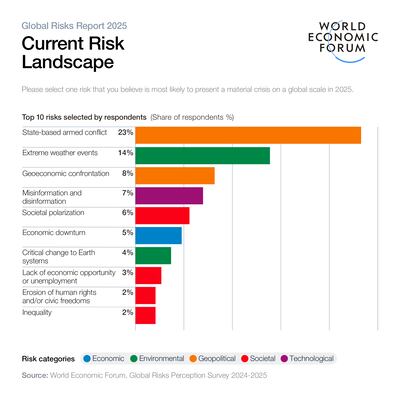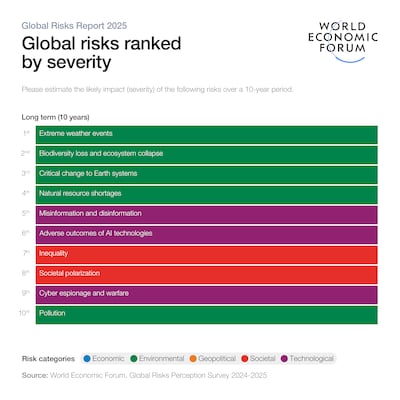The potential for state-based armed conflict has emerged as one of the biggest immediate risks for 2025, according to the World Economic Forum's annual Global Risks Report, with more than 25 per cent of respondents citing it as the most severe threat.
"The risk of further destabilising consequences following Russia’s invasion of Ukraine, as well as in the Middle East and in Sudan are likely to be amplifying respondents’ concerns beyond 2025," read the report.
"In a world that has seen an increasing number of armed conflicts over the last decade, national security considerations are starting to dominate government agendas."
The Global Risks Report includes the views of 900 global risks experts, policymakers and industry leaders who were surveyed between September and October of 2024.

According to the report, over the next two years, misinformation and disinformation will also continue to be a concern over the short term, with environmental disasters and cyber espionage also contributing to unease in the years ahead.
"Respondents are far less optimistic about the outlook for the world over the longer term than the short term," read a synopsis of the report.
And those concerns are likely be compounded by other issues.
"Nearly two thirds of respondents anticipate a turbulent or stormy global landscape by 2035, driven in particular by intensifying environmental, technological and societal challenges," it added.
Trade wars, like that threatened by US president-elect Donald Trump against China, Canada and Mexico, could lead to hesitancy around investment and innovation spending.
Speaking about broader trade barriers going up worldwide, Carolina Klint, chief commercial officer for Europe at Marsh McLennan, which co-authored the report, said: “It is possible that the uncertainty now surrounding trade policies lead to a bit of a wait and see approach among businesses, which could, in fact, stall innovation and investment.
"And I think given the geopolitical tensions and protectionist policies that we see developing, we would likely see trade wars develop."
Such protectionism could stall the advances that are expected to be made in the fields of AI.
"You have the other side of the coin, which is that tech companies often rely heavily on global supply chains, and maybe particularly with Asia for manufacturing and components," Ms Klint said.
Yet, the WEF report warns that AI concerns could quickly climb up the charts.

"Complacency around the risks of such technologies should be avoided given the fast-paced nature of change in the field of AI and its increasing ubiquity," the report read.
"Indeed, adverse outcomes of AI technologies is one of the risks that climbs the most in the 10-year risk ranking compared to the two-year risk ranking."
Climate change-based concerns such as extreme weather events, a loss of biodiversity and natural resource shortages dominated the longer-term concerns of many surveyed.
For all the headlines and ongoing developments revolving around artificial intelligence, concerns about AI, and in particular, adverse outcomes of the technology, ranked low among the worries of those who took part in the survey.
The 2025 report also pointed out that the fears over misinformation and disinformation may get more attention due to the ability of AI to produce "false or misleading content at scale, and how that relates to societal polarisation".
Overall, the results of the 2025 report shows that while those surveyed are increasingly concerned about instability over the short term, they are significantly more concerned and less optimistic about the long term.
"Rising geopolitical tensions, a fracturing of global trust and the climate crisis are straining the global system like never before," said Mirek Dusek, managing director for the World Economic Forum.
"In a world marked by deepening divides and cascading risks, global leaders have a choice: to foster collaboration and resilience, or face compounding instability. The stakes have never been higher."
The report concluded by projecting that the "western-led global order" would continue a decline in terms of influence, but still remain relevant, while other areas of the world would continue to emerge.
"Alternative power centres are likely to strengthen, not just led by China, but also by key emerging powers, including India and the Gulf states."
The annual global risks report comes less than one week before the WEF's Annual Meeting in Davos, Switzerland.
This year's annual meeting is being held under the theme of "collaboration for the intelligent age".


